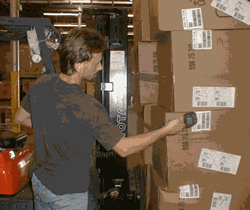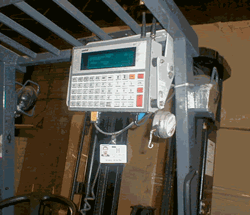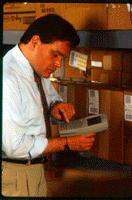
|
Bar Code Data Capture And The Manufacturing Industry: Strategic Solutions For ProductivitySymbol Technologies, Inc. Executive Summary Across all industries, bar code data capture solutions are recognized building blocks for growth. Today, bar code data capture solutions represent more than a new way to capture information; they offer strategic advantages for a wide variety of business. Bar code data capture solutions offer the power to move information in a timely and accurate way. Information captured and controlled at its source enables personnel to make better decisions to directly support productivity and profitability.
Inventory management is usually the first area to investigate bar coding solutions. When performed manually, inventory management chores are time-consuming, paper-intensive, and error-prone. The introduction of bar coding facilitates the transition from "Just In Case" to "Just In Time" inventory management. From receiving through finished goods, inventory is accurately accounted for with less effort, less paperwork, and greater accuracy. Automated bar code-based solutions reduce inventory levels, locate misplaced goods, and identify outdated materials so valuable space can be reclaimed. These benefits can be quickly realized with the implementation of Symbol solutions in the receiving, incoming inspection, WIP, and shipping processes. The success (or failure) of today�s manufacturing systems is visible on a company�s financial statement. Success hinges on the ability to control information thru the entire manufacturing process. Bar code data capture solutions can change the very nature of many environments. This allows companies to better direct the flow of information through their plants to the management office. Technology Manufacturing is at the heart of the business world. Its many intricacies affect most businesses on a daily basis. In today�s competitive environment, effective factory automation is necessary for survival. Its benefits include labor efficiency, reduced labor requirements, and improved inventory control, quality control, productivity and customer service. Manufacturing facilities, both discrete and process, are dynamic environments. The key to successful management of a dynamic environment is the timely gathering and processing of accurate data. This processed data provides managers visibility of what is going on in the plant and what they must do to maintain profitable operations. In order to have access to this data, manufacturers invest large amounts of money in host computer systems and purchase manufacturing software packages or develop a custom system. Many commercially available manufacturing systems do an excellent job of processing and presenting data once it is entered. Unfortunately, the data entry care and feeding of these systems is accomplished by computer terminals and keyboards. Terminals and keyboards are the weak link in manufacturing systems. They don�t facilitate timely and accurate data entry. Key data entry has an error rate of approximately one character in every three hundred key strokes and is seldom timely because it�s difficult to locate terminals Production floors are often too harsh or cannot accommodate the real estate required for the placement of a terminal. The sources of data on receiving docks; shipping docks and warehouses are mobile and prohibit the use of terminals for entering data as the data is created. This results in feeding a manufacturing system untimely and error prone data and then management is provided historical data of questionable accuracy. There is, however, a solution to this problem. Bar code data capture with portable computing, RF (Radio Frequency) communications and industrial data capture terminals can provide manufacturers with the ability to feed their manufacturing systems with accurate and real-time data. This technology adds value to existing manufacturing systems. The most successful bar code data capture companies have developed systems that seamlessly integrate with existing hardware and/or software. Bar code data capture systems provide manufacturers with limitless opportunities to make their factories more competitive and efficient. Operations throughout the work flow can realize substantial savings on an everyday basis. From raw materials to quality assurance to finished goods inventory and shipping, bar code data capture adds efficiencies to each step in the process. Applications Receiving - Receiving is logically and functionally the first place where bar code data capture systems are applied. The purpose of receiving is twofold: to verify items, quantities and ship dates in accordance with the terms established with vendors; to notify production, purchasing, incoming inspection and accounts payable of the receipt. Bar code data capture streamlines this process, producing immediate results. Manually matching shipping documents against purchase order records is labor intensive. Bar coding shipments at the source is more efficient and less time consuming. By scanning the label on the outside of a box, a receiving clerk can quickly and accurately identify the item received. It associates the item�s purchase order, line item, part number, quantity, and the date of receipt within your database. This "license plate" will allow you to track the item�s movement throughout the company by just scanning one barcode.
Raw Material - Before material can be put-away, it may need to be lot sized and inducted. The induction process may determine the specific location where the material is to be stored. Scanning the "license plate" assigned to the shipment in receiving, can be used in the induction process to associate the individual sized lots to specific inventory locations. The put-away-process is verified by bar coding inventory locations. Work in Process (WIP) - Once material is issued to the production process, it may be difficult to track how much material is in WIP. Material pulled from raw material against a bar coded pick list - and issued against a bar coded work order- maintains the integrity of what�s in WIP. Bar coding the operations, work centers and control points of the manufacturing process provides accurate tracking of WIP. Quality Assurance/Test Reporting/Scrap/Rework/SPC - As material and sub-assemblies move through the manufacturing process, quality assurance tests must be performed and the results recorded. By applying bar coded labels to each subassembly and later to the final product, progress can be tracked through the quality process. Should an assembly fail, the reason for failure can be associated with the assembly itself. And this information can be used to track yields thus efficiently directing the rework personnel�s efforts. Packaging - The packaging function involves boxing individual product with collateral material and mispacked product becomes a D.O.A. However, scanning bar coded products and collateral material assures accurate packaging inspection during the packaging process. Finished Goods Inventory/Picking/Packing/Shipping - Finished goods inventory management demands that inventory be made available by part number, location, quantity, serial number and date of manufacture. The databases(s) created through the use of bar code data capture can be used to automate the management of your finished goods inventory. Finished goods put-away and order picking can be automated to allow for interactive management of these functions. This interactive inventory management allows your inventory clerks and forklift drivers to work with your warehousing system in every step of the process. Part numbers, quantities and locations are verified, insuring that the correct item in the exact quantity is stored or picked from the exact location. During the order packing process, verification of each customer�s order can be done in the same manner used in the packaging of individual products. A customer�s manifest, built by a serial number, can also be used by accounts receivable and field service to facilitate customer billing and the warranty process. The same manifest can be used to estimate the total weight of a customer�s order. By capturing the shipment�s actual weight from an electronic scale, another level of verification is built into the shipping process. Developing Solutions In Partnership Symbol Technologies is the world leader in the bar code data capture market. We attribute our strong growth to our philosophy of partnership. At Symbol, we have learned to focus attention on our core technologies and a reliance upon solid partnerships with our vendors and customers. The result is a deep commitment to solutions-based products, and a deep confidence in their quality and applicability to today�s challenges. By working with solutions-based companies and manufacturers of complementary technologies, Symbol has been able to participate in developing total solutions for industry requirements. Our three core technologies enable our partners to take the solution to the individual in the plant, warehouse and shipping dock.
Symbol brought bar code data capture into the next generation through the development of a two dimensional symbology that allows you to encode over 1800 characters in a single, rugged symbol. This symbology, called PDF417 (Portable Data File), maintains its data integrity even when up to half of the symbol is destroyed. Symbol Technologies is an industry driver, a company on the forefront of technology. Our record of technological innovation for the past two decades has produced automated solutions that are leading businesses into the next century. Our high-performance tools are easy to operate, requiring little training. They represent the next generation of business computing, "blue-collar computing," where the power of small, high-performance computers will migrate from white-collar desktops to the warehouse, factory floor and customer premises. With our technology, information (in the form of bar codes) can flow from worker environments upwards to management offices. It gives management real information in real time, transforming the decision-making process into one based on quantifiable fact, rather than theory, expectation or projection. Symbol Technologies would like to work with you to change the way manufacturing works. In partnership, we can move forward to develop solutions for the next century. ©1997 Symbol Technologies, Inc. Holtsville, NY |
top
Home |
The Company | Systems
Solutions | Products
& Pricing
Software &
Support | Reseller
Resources | Contact
Compsee
 Throughout
the manufacturing industry, bar coding applications are being
investigated and implemented. As each manufacturer discovers successful
bar code applications and their associated benefits, they quickly
seek new applications for the technology.
Throughout
the manufacturing industry, bar coding applications are being
investigated and implemented. As each manufacturer discovers successful
bar code applications and their associated benefits, they quickly
seek new applications for the technology. Incoming
Inspection - Once received, production
material must be inspected prior to inducting it into raw material
stores or issuing it to the production floor. A formal inspection
procedure should exist for each item and this procedure should
include the parameters for accepting and rejecting production
material. Inspection results are often recorded on a clipboard
or manifest, which is keyed into a database at a later date. However,
by using a bar coded menu of inspection criteria and results,
inspectors can associate the results of an inspection with the
item being inspected. By scanning the item�s "license plate"
and the results of the inspection, all information is captured
quickly and accurately. The identity of the inspector can also
be captured by scanning a bar coded identification badge as part
of the inspection process.
Incoming
Inspection - Once received, production
material must be inspected prior to inducting it into raw material
stores or issuing it to the production floor. A formal inspection
procedure should exist for each item and this procedure should
include the parameters for accepting and rejecting production
material. Inspection results are often recorded on a clipboard
or manifest, which is keyed into a database at a later date. However,
by using a bar coded menu of inspection criteria and results,
inspectors can associate the results of an inspection with the
item being inspected. By scanning the item�s "license plate"
and the results of the inspection, all information is captured
quickly and accurately. The identity of the inspector can also
be captured by scanning a bar coded identification badge as part
of the inspection process. Symbol
Technologies offers our partners quality capabilities in the area
of bar code scanning, hand-held computing and wireless data communications.
We believe strongly that this triad is a solid base by which manufacturing
solutions can be developed and implemented with strong return
on investment. Our commitment to the manufacturing industry is
to provide solutions that seamlessly integrate into existing systems
and through the quality process. Should an assembly fail, the
reason for failure can be associated with the assembly itself.
And this information can be used to track yields thus efficiently
directing the rework personnel�s efforts also provide the value
added of timely and accurate data management. This value added
also includes applications such as warehouse management, time
and attendance, quality systems. Anticipating industry needs,
our wireless communications products lead the way to unrestricted
installation (no FCC license required). Responding to the need
for unencumbered operation, our new hands-free scanning products
enable personnel to perform data capture operations with the movement
of a single finger.
Symbol
Technologies offers our partners quality capabilities in the area
of bar code scanning, hand-held computing and wireless data communications.
We believe strongly that this triad is a solid base by which manufacturing
solutions can be developed and implemented with strong return
on investment. Our commitment to the manufacturing industry is
to provide solutions that seamlessly integrate into existing systems
and through the quality process. Should an assembly fail, the
reason for failure can be associated with the assembly itself.
And this information can be used to track yields thus efficiently
directing the rework personnel�s efforts also provide the value
added of timely and accurate data management. This value added
also includes applications such as warehouse management, time
and attendance, quality systems. Anticipating industry needs,
our wireless communications products lead the way to unrestricted
installation (no FCC license required). Responding to the need
for unencumbered operation, our new hands-free scanning products
enable personnel to perform data capture operations with the movement
of a single finger.